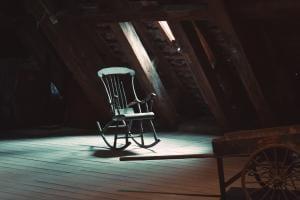My mother sent me this ages ago and I finally got around to reading it. It is utterly brilliant—the writing, the insight, the poking of a goodly sized hole through the thin paper veneer of something that looks clever but is really…just like everything else.
It is a timely piece, for me, because already one of the nice things we acquired at Christmas time for one of our children is broken. All three of the younger girls wanted rocking chairs, for reasons they could not explain, but probably had to do with the tragedy that the lovely rocking chair that we picked up by the side of the road finally fell to bits, and then another chair had a catastrophe, and so that in our big beautiful living room where there should be plenty of space for us all to sit comfortably, there were not enough actual chairs, and so two or three people always ended up on the floor and fights filled the air over how to sit three people on the couch plus two angry and selfish dogs. So, on some unconscious level, the three girls, who often ended up on the floor next to an outlet charging an always empty device, asking for a chair for Christmas must have seemed the obvious thing.
But then the nicest of the chairs three broke yesterday. The smallest, most delicate child was sitting rocking happily and the wretched thing came to bits right underneath her. She absolutely wept, and so, in the middle of a busy week, someone (Matt) will have to search the highways for a chair that looks very much like the one she so briefly loved.
Minimalism is billed as a lifestyle choice, one among many that you can, and perhaps ought, to choose in your quest for authentic self-expression. You can be Buddhist and Suburban and Minimalist or Christianish and Intercity and Intentional or Secular and Progressive and Freelancing. Mix and match a kaleidoscope of categories on your journey towards whoever you really are and you’ll eventually be happy, fulfilled, balanced, whatever it is you’re searching for.
My own lifestyle choice, besides being Christian, has been to try to never buy anything. I didn’t come to this point out of virtue, but because things cost money, and it is stressful to watch your bank account go down as the weeks roll by, knowing that you have to feed all the people all the way through the month. They are all just as hungry on the first day of the month as the last. And if they are growing, they might even be hungrier. You have to buy food, over and over and over and over. And something to get the dirt out of your clothes. And some way to educate them. This, to me, feels like a great tragedy.
The greater tragedy, though, is that things break, the shoes wear out, the nice top gets a hole in the sleeve, the favorite pair of trousers fray at the end, the text-book has coffee spilled all over it, the device gets dropped one too many times, the chair comes apart right under you. And so then you have to decide, Will I go get this thing again? Or something like it? Will I do without? Will I try to mend it? Will it join the graveyard of broken things (the garage) until the spring when we finally sort through the detritus of the winter and make a clean sweep? Or will I actually look into my coin purse and find the money to buy another one? These decisions could be made under the guise of some grander ideal, some enlightened principle, some pretense that your own joy is always at the forefront of your consciousness, or they can be made as a concession to the reality of the human person, or people, around you whom you purport to love.
I am utterly charmed that “minimalism,” billed as a way of life, a way of happiness, a way of truth, is just one more empty human religion, already being chucked aside into the dustbin of history with all the others. It makes promises it can’t keep. It pretends to be cleverer than it really is. It falls into the same consumerist, sinful, individualistic ruin that every human invention finally does. It is the broken chair of our time. Unlike our lovely chair, however, it doesn’t need to be replaced by anything. You can just go back to whatever it was you were doing before.





